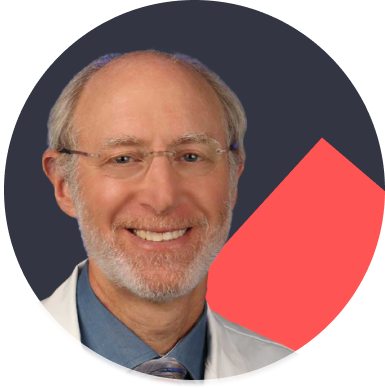Navigating Complexity with
Dr. Daniel Wolpaw

A Conversation with Dr. Daniel Wolpaw
“We want to make things simple. We want to get to certainty and agreement, but the reality is, we have to learn to navigate a lack of certainty and a lack of agreement.”
Bio
Daniel Wolpaw, MD, is a Professor of Medicine, a Senior Consultant for Educational Innovation, and Co-Director of the Junior Faculty Development Program at Penn State. He has a number of publications in the areas of health systems science, the humanities including communication and doctor-patient relationship. His areas of interest include curriculum development, critical and systems thinking, adaptive expertise, professional identity formation, and the use of literature to encourage mindfulness and humanistic care.
What is one of your life experiences that shaped the way you think today?
“My mother was a professor in speech and language at Case Western Reserve,” Dr. Wolpaw replied, “I grew up with her moving from a more traditional role in her generation, of a mother, to get her PhD in that area, and take on a leadership role and a teaching role at a major university. But I’ve always been interested in education.”
One experience that greatly formed Dr. Wolpaw’s career occurred after his sophomore year of college, when he took a year off for a field study program. During that time, he found a job teaching school in a little prep school in England. As he explained, “It was just a year of discovery for me, and experimentation, and I think back to that often in terms of the things that I did and wrote at the time, and how that’s helped me as I’ve moved through my career.”
How can doctors better utilize creativity or creative thinking in their day-to-day lives?
“I really feel that creativity operates in complexity, but so does science. And so does art. And so does learning. And as people, we are complex. And that’s where we live as well. So we want to make things simple. We want to get to certainty and agreement, but the reality is, we have to learn to navigate a lack of certainty and a lack of agreement. And I think that is significantly operative in medicine, and the sciences as much as it is in other creative aspects of work, including writing and art, and things like that.”
As Dr. Wolpaw notes, there is the expertise we are used to in medicine. And then there is the expertise of learning things and using that space you’ve created to take on unfamiliar things and to ask the next question.
“One of the definitions of complexity I learned early on, was this idea that a simple system is like baking a cake. And a complicated system is like sending a rocket ship to the moon. You got to get all the numbers right, but it’ll work if you get it right. And the complex system is like raising a child. There’s no formula for that. Education is the same way. There’s just no formula that will always work in education, because there’s two complexities.”
How can we be both intellectual and humble at the same time?
“If you dig into the literature on humility, it’s hard to get past religion. So, we added intellectual to put it in a different kind of situation in context than religion.”
“To be able to say, I don’t know everything about this. This is what I think I know, this is what I have some reasonable confidence in, but there’s a lot that I don’t know. And I don’t think it ends with being a learner. I think we all continue to be in that situation, where there are limits to what we know and what we’ve experienced. And we have to be continuously recognizing that.”
“For me, in my clinical role, if I feel very comfortable about a diagnosis, to me, that’s a red flag. Maybe I’m right, but I need to just be aware of that being really comfortable with something can also be dangerous. Especially in medicine, when there’s just too many variables, and it’s too complex.”
If there was one thing you wished you knew when you entered medical school, what would that be?
“Listen to yourself. There’s a whole lot that goes into that. Because I think there’s so many extrinsic motivators using self-determination theory language, but there’s so many extra extrinsic motivators in our lives, and it’s easy to be completely responsive to them. But it’s just not very satisfying, and it’s kind of a recipe for burnout.
Dr. Wolpaw continued, “And I would just link that to being nice. I can’t tell you how important it is just to be nice. People really appreciate it. And it doesn’t substitute for being competent and knowledgeable, and it doesn’t necessarily translate to doing the right thing. But in terms of interprofessional relationships, in terms of patient relationships, in terms of collegial relationships, it makes a huge difference!”
One final piece of advice Dr. Wolpaw would share with his younger self is the importance of good writing. “I can’t tell you how important just being a decent writer is,” he stated, “I don’t think people appreciate how many doors it opens for you when you can express yourself clearly and confidently in writing. It opens doors in terms of collaborations, it opens doors in terms of getting your own ideas out to the world.”
Pearls of Wisdom
- We must learn to navigate a lack of certainty and lack of agreement, which is why creative problem solving is an important skill as a physician.
- Be willing to work through the discomfort of being challenged. That will open the doors for mentors to speed up our progress.
- We are not just treating diseases, we are dealing with people. Make the effort to connect with the patient in the room before jumping to medical history.
